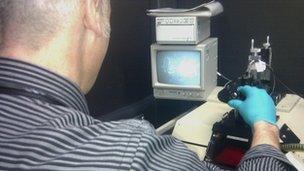'Higher cost' of Forensic Science Service closure
- Published

Private providers were expected to expand into the gap left by the FSS
The cost of closing down the Forensic Science Service (FSS) could be more than three times the UK government's estimate, says a leading researcher.
The Home Office quotes a figure of £95m for shutting the service, which once employed 1,600 people.
But Dr Chris Maguire said it would be between £300m and £350m when other expenditure, such as taking forensics work inside police forces, is included.
The FSS had been losing £2m per month when its closure was announced in 2010.
The government said allowing it to go into administration would have endangered criminal justice.
Its plan was for private enterprise to expand into the gap left behind by the FSS.
The work by Dr Maguire, from Northumbria University Centre for Forensic Science, is one of the first independent estimates of the cost to the British taxpayer of shutting the service.
He spent 30 years as a scientist with the FSS, before taking up his academic position in 2010.
Compiled using publicly available data as well as details gathered through Freedom of Information (FOI) requests, the results are outlined in the scientist's written evidence to a select committee follow-up inquiry into the closure.
Dr Maguire is preparing a full paper on the matter for submission to an academic journal.
"The actual costs of FSS closure must lie somewhere between £300m and £350m, if all of the costs of the police in-sourcing of forensic science activities formerly delivered by [forensic science providers] are taken into account," Dr Maguire explains in his written evidence.
In-house work
"In-sourcing" describes the practice by which police forces bring forensic work in-house in order to make cost savings.

The analysis includes the cost of building a forensic laboratory in Wakefield
The calculation includes the £60m cost of running a Metropolitan Police lab in Lambeth - where 120 FSS staff were transferred after the closure - over 10 years - a cost, says Dr Maguire, "that is being borne by the Met Police as opposed to anyone else".
It also factors in the cost of operating the national forensic archive for 10 years (£20m), the £21m spent on the construction of a new laboratory in Wakefield, West Yorkshire, and an £18m loan that was written off.
"What has actually been the cost? It's not simply the cost of paying off the staff, paying off contracts to run buildings, or getting out of leases," Dr Maguire told BBC News.
He said the level of expenditure needed to shut down the service could have maintained the FSS in perpetuity even if the government had pumped in £1m per month.
In December 2011, Foreign Secretary William Hague wrote to the European Commission stating that the closure of the FSS required support of about £100m.
In its submission to the follow-up inquiry, the Home Office estimated the final cost of closure would be around £95m.
It explained that it had excluded a £20m provision to cover a deficit in the accrued pension benefits for FSS staff, which the government is protecting. But the Home Office argued this liability was not a cost of closure as it reflected an existing deficit in the pension scheme.
Private providers complain that the practice of in-sourcing acts as an impediment to the expansion of the forensic market.
Private forensics firm LGC estimates that the size of this forensics market, outside the work police do themselves, fell from roughly £155m in 2010 to £70-80m in 2012.
In 2011, crime and security minister James Brokenshire said the external market was likely to contract to 110m, but only by 2015.
A Home Office spokesperson told BBC News: "The Forensic Science Service was losing £2m a month and had to be wound down in order to protect taxpayers from further costs. The total direct cost of closure is around £95m and the figure provided by Dr Maguire is not accurate."
- Published12 May 2012
- Published31 August 2012
- Published18 July 2012
- Published31 October 2011
- Published4 July 2011
- Published28 April 2011
- Published11 March 2011
- Published2 March 2011
- Published25 February 2011
- Published14 December 2010